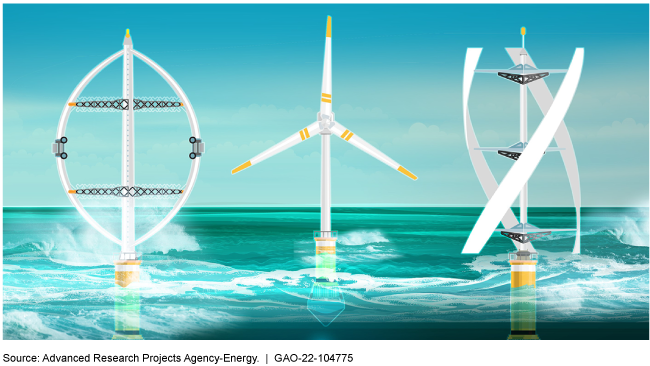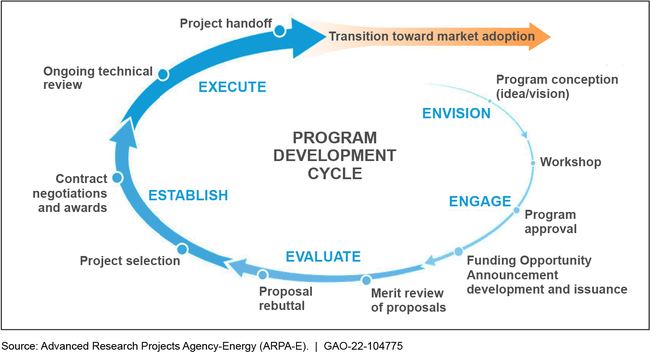Advanced Research Projects Agency-Energy: Agency Has Practices for Avoiding Duplication and Involving Stakeholders in the Development of Research Programs
Fast Facts
Congress established the Advanced Research Projects Agency-Energy in 2007 to develop transformative energy technology that may be too high risk for private industry to undertake. We looked at how ARPA-E coordinates its research with other offices within the Department of Energy.
The agency has practices that help manage overlap and duplication of its energy-related research projects. Officials from other DOE offices and elsewhere participate early in the program development process, which has helped identify potential duplication. ARPA-E officials plan to publish a new strategic plan in February 2022 that may also help coordinate its research.
ARPA-E reviewers found some overlap or duplication in proposed research for a floating wind turbine program and proposed adjusting these projects.

Highlights
What GAO Found
The potential to transform the energy sector through transformative research and development, and the Advanced Research Projects Agency-Energy (ARPA-E) supporting efforts, are critical to enhancing the United States' economic and energy security. ARPA-E is tasked with carrying out transformative energy-related research that does not duplicate work being done by other agencies.
GAO found ARPA-E has practices in place to help manage overlap and duplication during its program development cycle. ARPA-E coordinates with other stakeholders in the Department of Energy (DOE), as well as those at other agencies, by inviting officials from those offices to participate early in the program development process. These opportunities occur primarily in the initial stages of the program development cycle (see figure), which ARPA-E calls the “envision,” “engage,” and “evaluate” stages. This participation has occurred on an ongoing basis and has helped manage overlapping research efforts while identifying potential duplication.
ARPA-E's Five-Stage Cycle for the Development of New Research Programs, including Project Selection

ARPA-E officials participate in DOE working groups, coordinate on announcements for open funding opportunities, and participate in other strategic coordination efforts to inform DOE stakeholders of the agency's energy-related research and development efforts. In addition, ARPA-E's Strategic Vision was developed in 2013, as required by the America COMPETES Act, to guide future investments. The act was amended in 2020 to require an updated Strategic Vision by October 1, 2021. According to officials from DOE's applied science offices, an up-to-date Strategic Vision could provide them a better understanding of the issue areas on which ARPA-E is focused, allowing DOE stakeholders to ensure that they are appropriately coordinating with ARPA-E on relevant research efforts. ARPA-E officials are working with DOE to issue a new Strategic Vision by February 2022.
Why GAO Did This Study
Congress established ARPA-E in 2007 as an agency dedicated to developing energy technology that may otherwise be too high-risk for private industry to undertake.
GAO was asked to review ARPA-E's efforts to coordinate its research with other DOE offices. This report examines (1) the practices ARPA-E uses to manage overlap and duplication of its energy research with DOE's other research efforts, and (2) the actions ARPA-E takes to coordinate with DOE stakeholders in conducting its energy research and development activities.
GAO reviewed DOE policies and other agency documents; interviewed DOE officials; and collected and analyzed data on selected ARPA-E projects since ARPA-E's first appropriation in 2009.
For more information, contact Frank Rusco at (202) 512-3841 or RuscoF@gao.gov.
